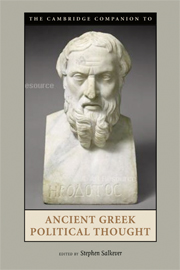Book contents
- Frontmatter
- Introduction
- 1 Homer and Political Thought
- 2 Foundings vs. Constitutions: Ancient Tragedy and the Origins of Political Community
- 3 Most Favored Status in Herodotus and Thucydides: Recasting the Athenian Tyrannicides through Solon and Pericles
- 4 Thucydides and Political Thought
- 5 “This Way of Life, This Contest”: Rethinking Socratic Citizenship
- 6 The Political Drama of Plato’s Republic
- 7 Practical Plato
- 8 Reading Aristotle’s Nicomachean Ethics and Politics as a Single Course of Lectures: Rhetoric, Politics, and Philosophy
- 9 Lived Excellence in Aristotle’s Constitution of Athens: Why the Encomium of Theramenes Matters
- 10 The Virtue Politics of Democratic Athens
- 11 Origins of Rights in Ancient Political Thought
- 12 The Emergence of Natural Law and the Cosmopolis
- Select Bibliography
- Index
7 - Practical Plato
Published online by Cambridge University Press: 28 September 2009
- Frontmatter
- Introduction
- 1 Homer and Political Thought
- 2 Foundings vs. Constitutions: Ancient Tragedy and the Origins of Political Community
- 3 Most Favored Status in Herodotus and Thucydides: Recasting the Athenian Tyrannicides through Solon and Pericles
- 4 Thucydides and Political Thought
- 5 “This Way of Life, This Contest”: Rethinking Socratic Citizenship
- 6 The Political Drama of Plato’s Republic
- 7 Practical Plato
- 8 Reading Aristotle’s Nicomachean Ethics and Politics as a Single Course of Lectures: Rhetoric, Politics, and Philosophy
- 9 Lived Excellence in Aristotle’s Constitution of Athens: Why the Encomium of Theramenes Matters
- 10 The Virtue Politics of Democratic Athens
- 11 Origins of Rights in Ancient Political Thought
- 12 The Emergence of Natural Law and the Cosmopolis
- Select Bibliography
- Index
Summary
Plato's Statesman is a strange dialogue, possibly the strangest he wrote. In it an anonymous Eleatic Stranger not merely argues that a statesman is defined by his knowledge alone, and that it does not matter whether this “statesman” ever puts that knowledge into practice, even simply as an advisor to a ruler. The Eleatic goes so far as to suggest that human beings ought to be understood not in terms of our distinctive ability to reason or speak, but as featherless bipeds or two-legged pigs. He even asks his auditors to suppose that there was a time long in the past when the cosmos reversed the direction of its movements so that the cycle of the generation of animals was also reversed. Human beings sprouted from the earth full grown with gray beards and gradually became younger and younger until their seeds wasted away and the direction of the movement of the cosmos again changed.
Readers might be tempted to conclude that the dialogue is one big, if rather weird, joke. Such a conclusion would be rash, however, because Plato says more in the Statesman about the actual possibilities and limitations of political practice than in either of his other two dialogues explicitly devoted to politics: the Republic and the Laws.
- Type
- Chapter
- Information
- The Cambridge Companion to Ancient Greek Political Thought , pp. 178 - 208Publisher: Cambridge University PressPrint publication year: 2009
- 1
- Cited by

